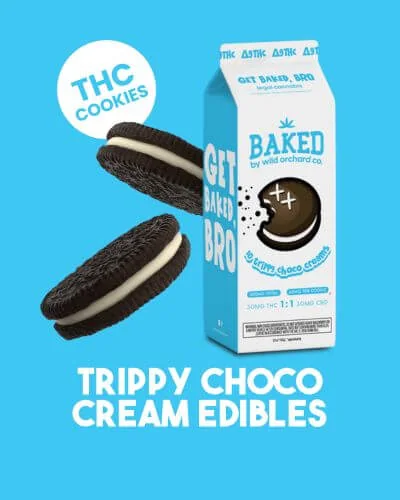Understanding THCA and THC
THCA vs. THC: Unveiling the Chemical Differences
THCA, the raw, non-psychoactive form of THC found in cannabis, undergoes transformation when exposed to heat, such as smoking. This process, known as decarboxylation, is key to understanding how non-intoxicating THCA turns into the psychoactive THC. Here’s a breakdown of what happens chemically:
- Decarboxylation: When THCA is heated, it loses a carbon atom from its molecular chain.
- Conversion to THC: This loss converts THCA into delta-9-tetrahydrocannabinol (THC), which is known for its psychoactive effects.
When you smoke cannabis, this conversion happens rapidly, ignited by the high temperatures involved. This chemical reaction is not only fascinating but also crucial for users seeking THC’s effects from raw cannabis.
In practical terms, understanding this process can guide your consumption choices. Knowing that THCA converts to THC can help you better anticipate the effects of different cannabis products, particularly if you are looking for therapeutic benefits without intense psychoactive effects. So, when choosing how to consume your cannabis, consider how the method of consumption might affect the presence of THCA and THC in your body.
The Magic of Heating: How THCA Transforms into THC
Heating THCA, the precursor found in fresh cannabis, is a transformative process. When THCA is exposed to heat, it undergoes a chemical reaction known as decarboxylation, changing its structure and effects dramatically.
- Decarboxylation Explained: Heat removes a carbon atom from THCA, converting it to THC.
- Immediate Transformation: This change happens almost instantaneously with the application of heat.
- Activation of Psychoactive Effects: THC, unlike THCA, is psychoactive, affecting the brain and body.
- Essential for Desired Effects: Smoking or vaping activates THC, essential for those seeking its psychoactive benefits.
- Influence on Potency: The efficiency of conversion can impact the potency and experience.
Through smoking or vaping, THCA in the plant material rapidly converts into THC, unlocking its psychoactive potential. This process not only enhances the user’s experience by activating THC’s effects but also maximizes the effectiveness of medicinal properties for those using cannabis for relief. Understanding this conversion is crucial for anyone looking to optimize their use of cannabis, ensuring they achieve the desired effects reliably and safely.

From Plant to Product: Does Your Cannabis Contain THCA?
Cannabis contains THCA, a precursor to THC, which remains inactive until exposed to heat. This is crucial for those looking to understand the potential impact of their cannabis products before use.
- Identifying THCA in Cannabis: Look for lab-tested products that list THCA content.
- Transformation Through Heat: Applying heat through methods like smoking or baking effectively converts THCA into psychoactive THC.
- Label Accuracy: Ensures that labels on cannabis products reflect THCA levels for informed usage.
- Conversion Rate: The efficiency of THCA converting to THC varies based on the heating method.
- Consumer Awareness: Understanding THCA content is vital for anticipating the effects of THC after consumption.
Heating cannabis triggers a significant transformation, turning THCA into the well-known psychoactive THC. This process, essential for achieving the desired effects from smoking or cooking cannabis, underscores the importance of understanding product contents. Accurately labeled cannabis allows consumers to predict the intensity of effects, ensuring a safe and enjoyable experience tailored to their needs.

Exploring the Effects of THCA and THC
Smoking for a Buzz: Does THCA Get You High?
When you smoke cannabis, the heat from the flame quickly turns THCA into THC, the compound known for its psychoactive effects. This means that while THCA itself won’t get you high, smoking it definitely can. The rapid conversion ensures that you feel the effects almost immediately, providing the “high” many users seek.
-
- Quick Effects: Smoking rapidly converts THCA to THC, ideal for those needing swift symptom relief or instant relaxation.
- Feeling the High: Learn how inhaling THC affects your mood and senses, typically bringing on feelings of euphoria or calm within minutes.
- Advice for Beginners: Start with small puffs to gauge your tolerance—this helps prevent the discomfort of overconsumption.
- Safety First: Always use cannabis in a safe, controlled environment, and avoid mixing it with alcohol or other substances to maintain a positive experience.
Through this process, users can effectively gauge how much to consume based on the immediate feedback they receive from their bodies. Smoking cannabis is particularly popular for its fast-acting results, making it easier for users to achieve their desired level of high without waiting for prolonged effects.
Beyond the High: Exploring the Potential Benefits of THCA
Exploring the value of THCA beyond just its transformation into THC reveals a world of potential benefits. This non-psychoactive precursor found in raw cannabis doesn’t create a high on its own, but its properties might be just as influential for health. Research highlights its anti-inflammatory and neuroprotective qualities, making it a subject of interest for those seeking therapeutic alternatives without the psychoactive effects of THC.
Potential Benefits of THCA:
- Anti-inflammatory: THCA has shown promise in reducing inflammation, a common culprit behind numerous health conditions.
- Neuroprotective Effects: It may protect nerve cells against damage, decay, and inflammation, potentially aiding in conditions like Parkinson’s and Alzheimer’s.
- Antiemetic Qualities: For those combating nausea, THCA provides relief without the intoxicating effects of THC.
- Growth Inhibition of Cancer Cells: Preliminary studies suggest THCA can slow the proliferation of cancer cells.
- Prevention of Obesity: THCA might inhibit lipid accumulation in fat cells, offering potential weight management benefits.
Understanding these aspects of THCA offers a broader perspective on how cannabis can be utilized for health without the high, emphasizing the importance of non-intoxicating cannabinoids in medical research.

The Science Behind Smoking THCA Conversion
When you smoke cannabis, a crucial transformation occurs: THCA, the non-psychoactive precursor found in raw cannabis flowers, is converted into THC, the compound responsible for the plant’s psychoactive effects. This conversion, known as decarboxylation, happens due to the application of heat. Essentially, smoking cannabis activates THC by removing a carboxyl group from the THCA molecule. This chemical reaction requires a specific temperature range to trigger, typically between 220°F and 315°F, which is easily reached when cannabis is burned in a joint or pipe.
Key Factors in THCA Decarboxylation:
- Temperature: The flame from a lighter typically exceeds 450°F, well above the threshold needed to convert THCA into THC.
- Speed of Reaction: The heat rapidly induces decarboxylation, making THC available for absorption through the lungs almost instantly.
- Bioavailability: Smoking efficiently delivers THC into the bloodstream, making its effects felt within minutes.
- Chemical Stability: The rapid heating ensures that THC does not degrade significantly during consumption, maintaining its potency.
- Efficiency: This method maximizes the psychoactive potential of THCA, offering a quick onset of effects.
Understanding the science behind this conversion helps consumers appreciate the immediate effects of smoking cannabis and informs their choices about consumption methods based on their personal needs and the desired outcome. This knowledge is especially useful for those using cannabis for symptom relief, as it provides a fast-acting option when timing is crucial.
Comparing the Side Effects of Smoking THCA vs. THC
Exploring the side effects of smoking THCA offers insights into its benign nature before heat transforms it. Unlike THC, THCA in its raw form doesn’t produce a high, making it a curious subject for those cautious about psychoactive effects.
- Minimal Psychoactivity: THCA doesn’t activate the same receptors as THC, ensuring no high.
- Possible Throat Irritation: Smoking THCA may irritate the respiratory system, similar to other smoke inhalation.
- Anti-inflammatory Properties: THCA retains potential health benefits without the psychoactive impact.
- No Red Eyes or Munchies: Lacking THC’s effects, THCA does not cause red eyes or increased appetite.
- Allergic Reactions: Like any plant material, smoking THCA might trigger allergies in sensitive individuals.
On the other hand, THC, when smoked, is well-known for its immediate psychoactive effects. This includes a range of sensations from euphoria and relaxation to potential anxiety and paranoia, especially at higher doses. THC also impacts coordination and perception, which can impair one’s ability to perform tasks that require focus and motor skills. Understanding these effects is crucial for anyone considering cannabis for therapeutic or recreational use, providing a basis for informed decision-making.

How to Ensure Maximum Conversion of THCA to THC While Smoking
To maximize the conversion of THCA to THC when smoking, understanding the proper techniques is crucial. Here are some focused tips:
- Grind your cannabis finely: This increases the surface area, allowing heat to more evenly decarboxylate the THCA.
- Use the right temperature: Smoking too hot can destroy cannabinoids. Aim for a controlled heat to ensure optimal conversion.
- Inhale deeply and slowly: This ensures that the smoke, which carries converted THC, is absorbed effectively.
Following these steps can significantly enhance the conversion rate from THCA to THC, maximizing the potential high and ensuring a more efficient use of your cannabis.
Continuing the discussion, it’s important to remember that the conversion efficiency also depends on the quality of the cannabis used. Higher quality, fresher cannabis tends to have more available THCA for conversion. Proper storage of your cannabis is essential to preserve its potency. Keep it in a cool, dark place to avoid premature decarboxylation and degradation of cannabinoids. By focusing on these aspects, users can improve their experience and ensure they get the most out of their cannabis products.
Alternative Ways to Activate THCA
Exploring different methods of activating THCA reveals how this cannabinoid transitions into its more famous form, THC. When THCA is exposed to heat through smoking, it undergoes a chemical reaction known as decarboxylation, which effectively transforms it into psychoactive THC. But smoking isn’t the only way to initiate this transformation. Let’s dive into other effective methods:
- Vaping: Like smoking, vaping heats THCA just enough to decarboxylate it into THC, offering a smoother experience.
- Cooking: Incorporating THCA into edibles requires heating it at a specific temperature to convert it without burning away the beneficial compounds.
- Dabbing: This method involves flash vaporization of cannabis concentrates, which are rich in THCA, under extremely high temperatures, quickly converting it to THC.
Beyond these traditional methods, each has nuances in terms of the efficiency of THCA conversion and the overall experience it provides. These alternative pathways not only allow for the enjoyment of THC’s effects in various forms but also open the door to more controlled dosages and potentially new therapeutic benefits.
Each method of activating THCA—whether it be through vaping, cooking, or dabbing—provides unique advantages and experiences. Vaping, for instance, allows for precise temperature control, which is crucial for maximizing the yield of THC while preserving other cannabinoids and terpenes. Cooking with cannabis, on the other hand, makes the effects longer-lasting and can be a more palatable option for those seeking relief without inhalation. Dabbing, known for its quick onset and high potency, caters to those who need immediate and effective relief. Understanding these methods enriches your cannabis experience, allowing for a more tailored approach to consumption and benefits.

FAQs
What happens to THCA when you smoke it?
When you smoke cannabis, the heat causes THCA, a non-psychoactive compound, to convert into THC, the chemical responsible for cannabis’s psychoactive effects.
Does smoking THCA give you the same high as THC?
Smoking THCA leads to its conversion into THC, which is psychoactive, thus providing a high similar to consuming THC directly.
How quickly does THCA convert to THC when smoked?
The conversion of THCA to THC happens almost instantaneously when exposed to the high temperatures achieved during smoking.
Can you get high from THCA without converting it to THC?
No, THCA itself is non-psychoactive and must be converted into THC through heat to produce a high.
What percentage of THCA is typically converted to THC when smoked?
While it can vary, typically around 70% of THCA is converted to THC when smoked, depending on the method and temperature.
Can edibles convert THCA to THC as effectively as smoking?
Yes, when properly decarboxylated before cooking, edibles can convert THCA to THC effectively.
What is the difference between THCA and THC in terms of legal status?
In many regions, THCA is not regulated as strictly as THC, which can make THCA-containing products legal where THC might not be.

What Happens in Your Body When You Smoke THCA?
When you smoke cannabis, the heat acts as a transformer, changing THCA into THC. This process is crucial because THCA alone doesn’t get you high; it needs to become THC to have that effect. Here’s what happens when you smoke:
- Heat Application: As the cannabis burns, the temperature rises, initiating the change.
- Decarboxylation: This is the scientific term for the heat-induced reaction that removes a carboxyl group from THCA, turning it into THC.
- Absorption into the Bloodstream: Once transformed, THC quickly enters your bloodstream through your lungs, beginning its journey to your brain.
This transformation is rapid and efficient, making smoking a favored method for those seeking immediate effects from THC.
Beyond just the conversion process, the immediate rush you feel when smoking is due to THC reaching your brain quickly. Here’s a closer look:
- Fast-acting: Smoking delivers THC directly into your bloodstream through the lungs, bypassing slower metabolic processes in the liver.
- Psychoactive Effects: Once THC hits the brain, it binds to cannabinoid receptors, altering mood, perception, and feeling a high.
- Duration: The effects are potent but typically short-lived compared to other consumption methods, like edibles.
Understanding this process can help users anticipate the intensity of effects and manage their experiences more effectively.

Legal Implications of THCA Conversion
When considering the legality of smoking THCA to convert it to THC, it’s essential to understand that regulations can vary significantly by region. THCA itself is typically legal because it does not produce psychoactive effects. However, once it is converted into THC through smoking, the legal status changes, as THC is often regulated due to its psychoactive properties.
- Understanding THCA’s Legal Status: THCA is not scheduled under federal law, but THC is.
- Impact of Decarboxylation: Smoking converts THCA to THC, potentially changing the legal status.
- State-by-State Variations: Cannabis laws differ across states; some allow medical and recreational use of THC, while others do not.
- Federal vs. State Law: Federal law still classifies THC as a controlled substance, which can conflict with state laws.
- Purchasing Legality: In regions where cannabis is legal, buying products high in THCA might be permissible, but the intended use could be scrutinized.
Legal implications extend beyond mere possession. If you smoke cannabis for its THCA content, understanding that it can convert to THC is crucial, especially if subjected to drug testing or living in areas with strict cannabis regulations. Always ensure you are fully aware of and comply with local and federal laws to avoid legal complications.

 Flash Sale
Flash Sale  Party Bundle
Party Bundle  Back in Stock!
Back in Stock! 










